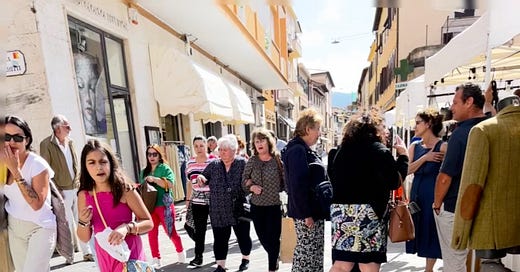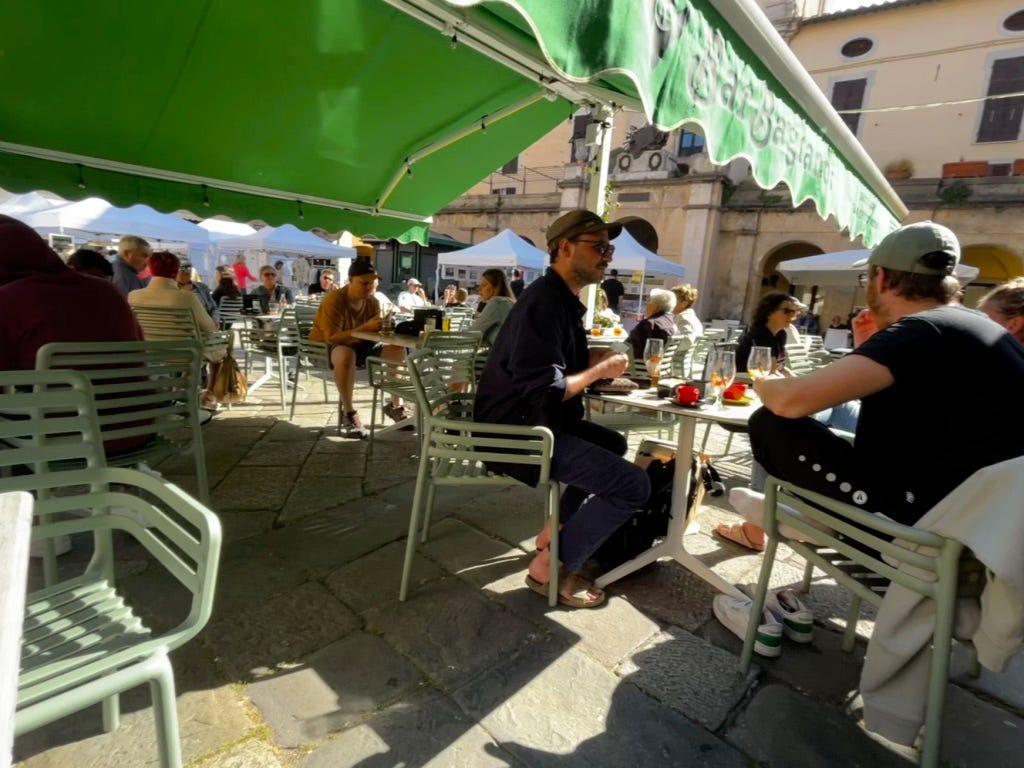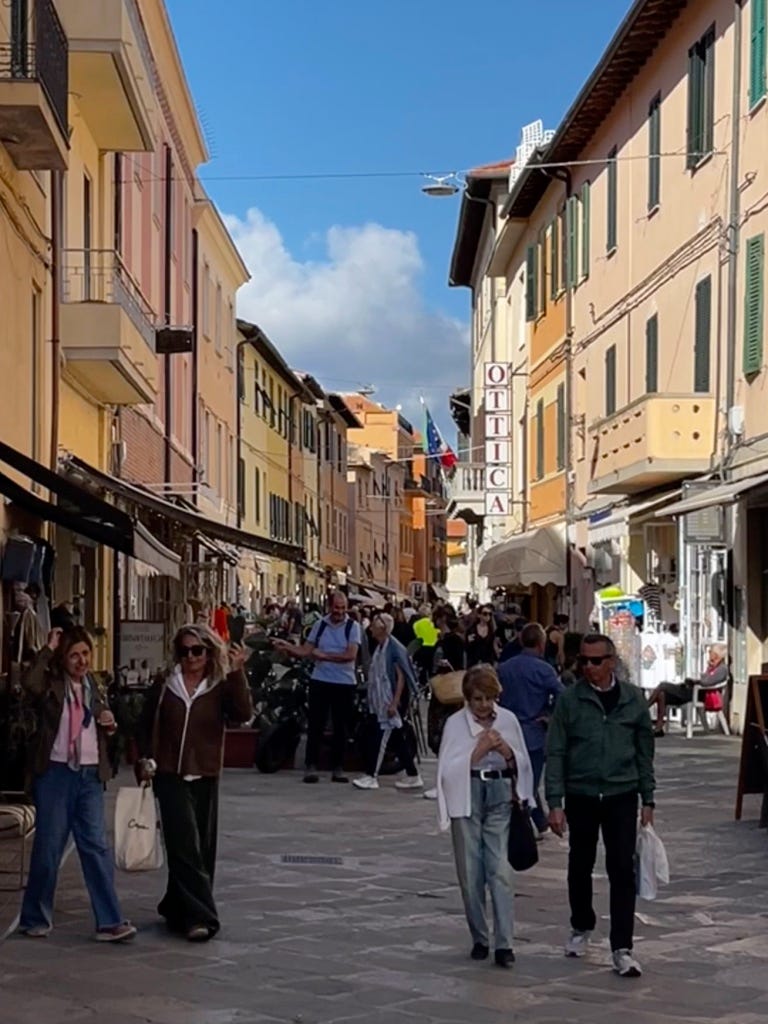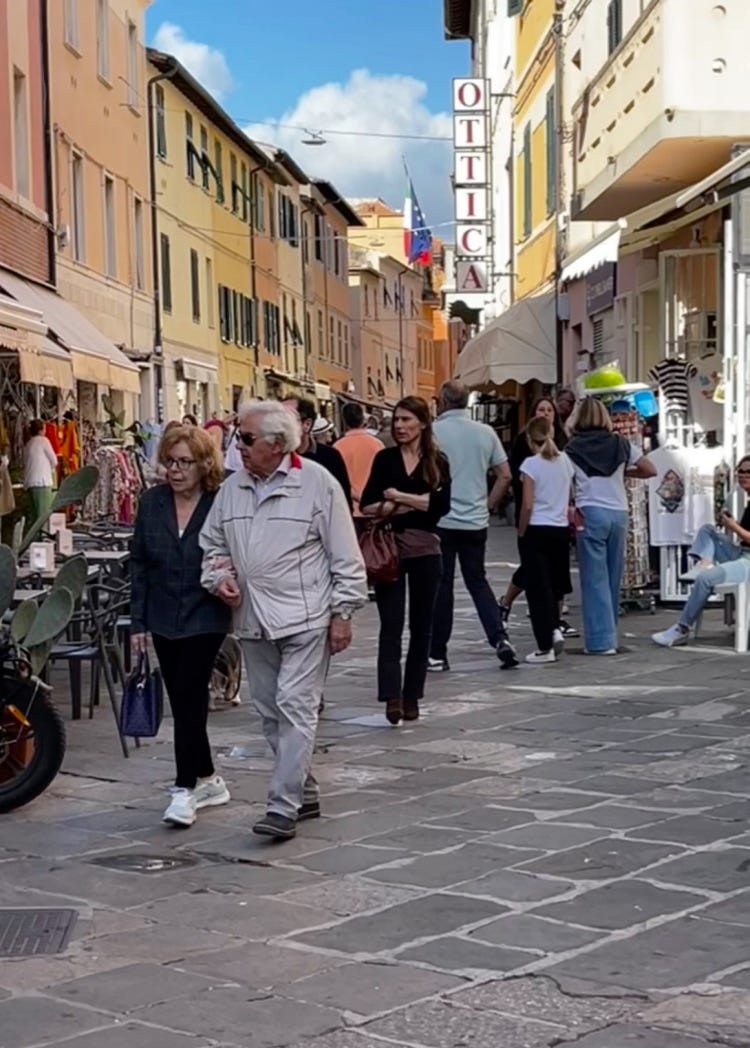The sun dipped low over Monte Argentario as Emi and I wound our way back home, the golden light casting long, soft shadows on the road ahead. At one of the many roundabouts, the second exit sign read "Orbetello." On a whim, we decided to detour, enticed by the prospect of discovering this little town situated on a lagoon.
We reached the heart of the paese and were fortunate to find parking just before the ZTL zone (Zona Traffico Limitato), better known as "DO NOT ENTER UNLESS YOU HAVE A PERMIT." The late afternoon sun bathed the town in a warm glow, and the main street had transformed into a cobblestone runway for pedestrians. Shops and boutiques were still open, showcasing their latest fashions and artisan crafts.
A little girl, her curls bouncing with every step, tugged at her mother’s hand, pointing eagerly at a gelateria. (ice cream shop) Of course, she would get it, we are in Italy, where such indulgences are permitted without guilt. A group of teenagers passed by, laughter bubbling up between them.
We soon found ourselves at Bar Bagianni, its large green canvas awning providing a welcome respite from the sun's persistent warmth. The small piazza it shaded was alive with chatter, where locals sipped their drinks, savoring the slow rhythm of the day. We ordered our usual—two espressos. Hers, strong, creamy, and dark. Mine, a basso, as I like it at this time of day. Caffè basso is a very short espresso, just a sip, literally, of rich, concentrated coffee. In Tuscany, they call it basso, meaning short. In other parts of the country, it’s often called ristretto. What I love about the basso is that it fills my mouth and senses with a rich, creamy caffeine taste that lingers, without the jolt a regular espresso would deliver. Oh, and you know why they give you a little glass of water with your coffee? It's to cleanse your palate, ensuring that every sip of your coffee is a pure, unadulterated indulgence.
As I leaned back in my chair, the sound of clinking glasses and soft murmurs floated around us, blending with the distant hum of the town. I watched as the Sunday passeggiata unfolded before us, a scene that felt both timeless and utterly in the moment.
La passeggiata—it’s more than just a walk. It’s the heartbeat of an evening in Italy, a tradition that threads through generations. I remembered, as a little boy in San Vittore del Lazio, how the word itself, passeggiata (pah-seh-JAH-tah), would light up the evening, promising a blend of excitement and comfort—a walk that wasn’t just about moving but about being. Being with family, with neighbors, with the entire village, as we all strolled the narrow streets together. The corsi, those main streets, transformed into runways where the effortless elegance of everyday life was on full display.
Here in Orbetello, the tradition was just as strong. Families emerged as the sun began to set, moving in groups that spanned decades. Grandparents, their steps slow but steady, walked hand in hand with grandchildren who skipped along beside them. Parents, deep in conversation, caught up on the day’s events, while old friends stopped to chat, turning the walk into a spontaneous gathering.
And as we walked, so did the town. Cafés and gelaterias became the evening’s focal points, places where the simple joy of a scoop of gelato or a sip of caffè could turn into a long, lazy pause. The evening flowed with a rhythm all its own, slow and easy, the very essence of la dolce vita.
The tradition of la passeggiata is like a dance between the past and the present, a beautiful reminder that some things are meant to stay the same. This is what I find most captivating about my old country. Despite the allure of modern conveniences, they don't let these distractions pull them away from cherishing and preserving their timeless traditions. Italians do this so naturally, so effortlessly, that it’s no surprise their relaxed pace of life is among the things emigrants miss most when they're abroad.
Arrivederci until next Saturday—always observing, always sharing, always sipping, always a tale from an Italian coffee bar.












Ciao Tino
E facile abituarsi a questa tradizione e moda di vita. Motivante e graziosi momenti con tanta gente!
👌
Les petites villes devraient t’engager pour que tu puisses faire leurs publicités.
On dirait que nous sommes sur place. Le café a toujours une place d’honneur dans tes textes.
👍👍